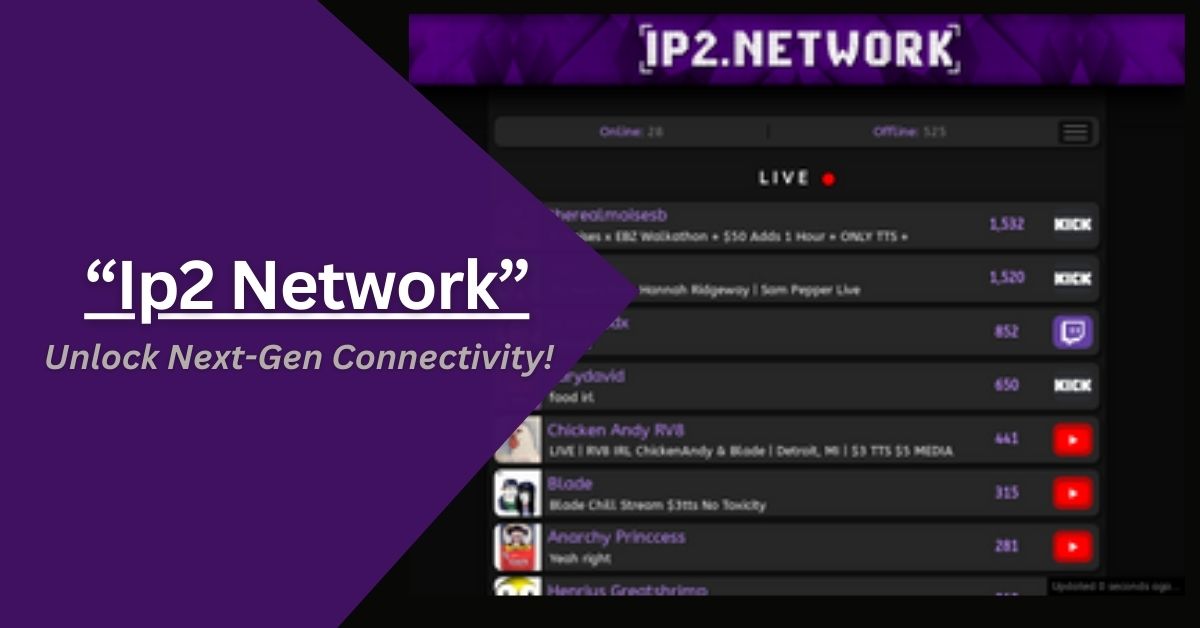In today’s digital landscape, IP2 networks are revolutionizing how we exchange and retrieve information across the internet, bringing about significant changes in connectivity.
IP2, or Internet Protocol version 2, is an upgraded online connection system. It offers better security and features and supports various devices and emerging technologies.
Join the IP2 network revolution and experience a safer, faster, and more connected online world.
Table of Contents
Understanding IP2 Networks – Dive Into The Future Of Online Connectivity!
IP2 networks, also known as Internet Protocol version 2 networks, mark a pivotal advancement in online connectivity. With a focus on bolstered security, heightened scalability, and compatibility with cutting-edge technologies, IP2 networks represent a paradigm shift in digital communication.
By embracing innovative protocols and architectures, these networks empower users to navigate the digital realm with unprecedented ease and assurance. Delving deeper into the intricacies of IP2 networks unveils their transformative potential, shaping the trajectory of internet usage and fostering new avenues for innovation and collaboration.
Also Check: UPMC Shift Select – Connect With Us!
The Growth Of Ip2 Networks – Discover The Future Of Digital Networking!
IP2 Networks has experienced remarkable growth, transforming the digital landscape. Originally conceived as an enhanced version of the internet protocol, IP2 Networks have evolved to become a dynamic force shaping how we connect and interact online.
This growth is evident in the increasing adoption of IP2 Networks across diverse digital platforms, fostering greater efficiency, security, and accessibility. As more devices integrate with this advanced network, the potential for innovation and seamless connectivity continues to expand, promising a future where IP2 Networks play a pivotal role in the evolution of our digital experiences.
You Also Have To Check: Matt Rife And Lucy Hale – A Captivating Story Unveiled!

Differences Between IP2 Networks And IPv4 Networks
| Aspect | IP2 Networks | IPv4 Networks |
| Address Space | IP2 networks offer a significantly larger address space, accommodating trillions of devices and unique addresses. | IPv4 networks have a limited address space, with approximately 4.3 billion unique addresses, leading to address exhaustion issues. |
| Security | IP2 networks feature enhanced encryption and authentication mechanisms, ensuring robust security measures to protect data and communications. | IPv4 networks typically rely on basic security features, such as firewalls and VPNs, which may be susceptible to cyber threats and vulnerabilities. |
| Scalability | IP2 networks are highly scalable, and capable of accommodating the increasing number of devices and users connected to the internet. | IPv4 networks face challenges related to scalability due to the limited number of available addresses, necessitating workarounds such as network address translation (NAT). |
| Protocol | IP2 networks utilize Internet Protocol version 2 (IP2), a modern protocol designed to address the shortcomings of IPv4 and support emerging technologies. | IPv4 networks use Internet Protocol version 4 (IPv4), an older protocol that has been the standard for internet communication but lacks the features and capabilities of newer protocols. |
| Integration | IP2 networks offer seamless integration with emerging technologies such as the Internet of Things (IoT), artificial intelligence (AI), and edge computing, enabling innovative applications and services. | IPv4 networks may face challenges integrating new technologies, requiring updates and modifications to existing infrastructure to support advancements. |
| Future Compatibility | IP2 networks are designed to be future-proof, with built-in support for upcoming technologies and protocols, ensuring long-term viability and adaptability. | IPv4 networks are becoming outdated and may require transition efforts to migrate to newer protocols, such as IPv6, to accommodate the growing demands of the digital age. |
Key Features Of Ip2 Networks – Discover The Power Of Next-Gen Connectivity!
Enhanced Security:
IP2 networks incorporate advanced security protocols to safeguard data and communications from cyber threats. This includes encryption, authentication, and intrusion detection mechanisms.
Scalability:
IP2 networks offer a vast address space, accommodating the growing number of devices and users connecting to the internet. This scalability ensures seamless expansion without compromising performance.
Quality of Service (QoS):
IP2 networks prioritize traffic based on predefined parameters, ensuring reliable and consistent performance for critical applications such as video streaming, VoIP, and online gaming.
IPv6 Compatibility:
IP2 networks are designed to integrate seamlessly with IPv6, the latest version of the Internet Protocol, ensuring compatibility with modern networking technologies and future-proofing infrastructure.
Efficient Routing:
IP2 networks utilize advanced routing algorithms to optimize data transmission paths, minimizing latency and maximizing throughput for improved network efficiency.
Support for Emerging Technologies:
IP2 networks support emerging technologies such as the Internet of Things (IoT), edge computing, and cloud services, enabling innovative applications and services to thrive on the network.
Flexibility and Customization:
IP2 networks offer flexible configurations and customization options to meet organizations’ diverse needs and adapt to evolving network requirements.
Management and Monitoring Tools:
IP2 networks offer robust management and monitoring tools, allowing administrators to manage network resources efficiently, diagnose issues, and optimize performance.
You Maybe Interested In: How Tall Is Jonathan Majors – Check Height Of A Rising Star!

Challenges Ip2 Networks Face – Discover Solutions For Better Networks!
Transition Complexity: Migrating from IPv4 to IP2 networks can be complex and costly, requiring significant time and resources to ensure a smooth transition without disrupting existing services.
Legacy System Compatibility:
Compatibility issues with legacy systems and devices designed for IPv4 can pose challenges for IP2 network adoption. This may require organizations to invest in upgrades or implement workarounds to ensure interoperability.
Security Concerns:
Despite enhanced security features, IP2 networks are still vulnerable to cyber threats such as DDoS attacks, malware, and unauthorized access. Continuous monitoring and proactive security measures are essential to mitigate these risks effectively.
Address Management:
While IP2 networks offer a vast address space, efficient address management is crucial to prevent address exhaustion and ensure optimal utilization of available resources.
Quality of Service (QoS):
Ensuring consistent QoS across IP2 networks can be challenging, especially for real-time video streaming and VoIP applications. Network congestion, latency, and packet loss must be carefully managed to maintain a satisfactory user experience.
Interoperability:
Ensuring interoperability between different IP2 implementations and devices from various vendors can be challenging. Seamless integration requires standardized protocols and thorough testing.
Regulatory Compliance:
Compliance with regulatory requirements and privacy laws, such as GDPR and CCPA, poses additional challenges for IP2 networks, particularly regarding data protection, privacy, and lawful interception.
Resource Allocation:
Efficient resource allocation, including bandwidth, processing power, and storage, is essential to optimize performance and meet the diverse needs of users and applications across IP2 networks.
Must Check: Jacelyn Reeves – From Flight Attendant To Hollywood Stardom!

Future Of Ip2 Networks – Embrace The Next Era Of Connectivity!
Enhanced Security: With advancements in encryption technologies and network protocols, IP2 networks will offer even greater security measures to protect against cyber threats and unauthorized access.
Scalability:
IP2 networks will be designed to accommodate the growing number of internet-connected devices, supporting the proliferation of IoT (Internet of Things) devices and applications.
Improved Performance:
Through optimizations in network architecture and protocols, IP2 networks will deliver faster speeds and lower latency, enabling smoother and more responsive online experiences.
Integration with Emerging Technologies:
IP2 networks will seamlessly integrate with technologies such as AI (Artificial Intelligence), blockchain, and edge computing, unlocking new digital transformation and innovation possibilities.
Related Post: My Cat Has Worms How Do I Clean My House – A Comprehensive Guide!
Global Connectivity:
IP2 networks will facilitate seamless global connectivity, enabling businesses and individuals to communicate and collaborate across geographic boundaries more efficiently.
Enhanced Privacy:
With a focus on user privacy and data protection, IP2 networks will incorporate advanced privacy-enhancing technologies to safeguard sensitive information and ensure compliance with data regulations.
Innovation in Services:
The future of IP2 networks will usher in a new wave of innovative services and applications, from immersive virtual reality experiences to real-time collaborative tools powered by robust and reliable network infrastructure.
FAQS:
How does an IP2 network differ from traditional networks?
IP2 networks offer several enhancements over conventional networks, including improved security features, better scalability to accommodate a more significant number of devices, and support for emerging technologies such as IoT (Internet of Things) devices.
What are the critical features of IP2 networks?
Key features of IP2 networks include enhanced security protocols, support for IPv6 addressing, improved Quality of Service (QoS) capabilities, and greater flexibility in network configuration and management.
When connecting to IP2 networks, what do I need to do?
To connect to an IP2 network, you need a compatible device with network connectivity capabilities. Simply access your device’s network settings, select the IP2 network from the list of available networks, and enter the network credentials (if required).
On IP2 networks, what security measures are in place to protect data?
IP2 networks employ advanced security measures such as encryption protocols, firewall protection, intrusion detection systems, and regular security updates to safeguard data and prevent unauthorized access.
Are there any challenges associated with IP2 networks?
While IP2 networks offer numerous benefits, they may face challenges such as compatibility issues with legacy systems, network congestion, and potential security vulnerabilities. However, these challenges can be mitigated through proper network management and security measures.
Conclusion:
IP2 networks significantly advance online connectivity, offering enhanced security and support for emerging technologies and shaping a safer, more efficient digital landscape.


